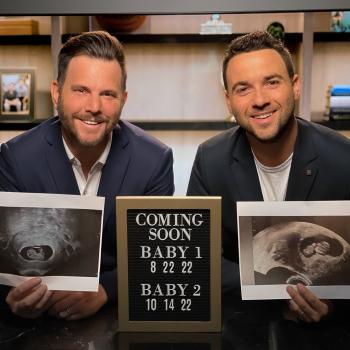In a recent exchange between Denny Burk and Kristin Kobes Du Mez on Twitter regarding her book Jesus and John Wayne, a relatively simple question arose:
When I read your book, I thought you treated evangelical opposition to gay rights as a negative thing. Others have told me that you personally affirm the church's teaching that homosexuality is sinful. Do you believe homosexuality is sinful?
— Denny Burk (@DennyBurk) November 26, 2021
To answer his question, Kristin Du Mez provides a 1,000 word response without a clear answer. His question wasn’t an open-ended question, but rather, a “yes” or “no” question, to which she equivocates on what should be a relatively simple answer. I find it interesting in her response that she appeals to the genetic fallacy in some sense, but she does so through a faulty understanding of what the genetic fallacy actually entails. For one to be guilty of committing this fallacy, they must discredit the argument based on the history of the one making the argument or their moral credibility, rather than the argument itself.
Now, had Denny Burk asked this question apart from a context that is germane to homosexuality, it might be considered a blatant red herring. Don’t misunderstand me as saying it would be unimportant—it is and would be even if the book didn’t touch on homosexuality in any manner. However, given that she does address the topic of gay rights in her book, Burk’s question is not only appropriate, but part and parcel to assessing her work “on its own merits.” And here is where things really took an interesting turn in Kristin’s response, which I would invite you to read (linked to above).
In her subsequent reasoning, she actually gives a bit of her own personal history and reasons, to some degree, that how she came to the conclusions she currently holds are shaped by this reality. To be fair, we are all shaped by environment to some degree as we come to embrace the ideologies we do. Paul speaks of this quite candidly in Rom. 12:1-2, using the passive sense of the word “conformed” to speak of how one is pressed into the mold of this world’s system of thought.
The reason I find this interesting though is not that she admits this, but rather, it is that she fails to see the irony of this in her mounting critiques on what is broadly defined as Christian Nationalism. In other words: even though she plainly admits that all sides are shaped by their history, culture, and experience—I believe she fails to see how this impacts her subsequent lack of an answer to a simple question on whether or not homosexuality is sinful. Much of the current debate on homosexuality within broader Christian circles is shaped by some degree to the current ethos on homosexuality that our culture embraces, and arguably, the same could be said for how she understands the egalitarian vs. complementarian debate.
This is why systematic theology books continue to be written and published for the Christian community. Each new generation must tackle objections to the doctrines of this historic, Christian faith, which presupposes that there actually is an historic faith with an objective truth that we are able to know, from generation to generation. And this is ultimately where I believe our core, foundational differences lay. For many, the goal isn’t necessarily to understand history in light of Scripture, but rather, to understand Scripture in light of history.
What I’m arguing for is not a rejection of historic theology (how theology has developed in the broader Christian tradition), nor even jettisoning the historical context as we read the Scriptures. Rather, what I’m advocating is a rather simple principle, in that Scripture itself should be taken on its own merits at the end of the day. To be sure, we need to understand the historic context of the Scriptures in order to rightly exegete a given passage, but the issue boils down to what one’s final authority is in these matters.
Coincidentally, what often happens in these types of debates is that the one who dissents from historic orthodoxy just so happens to find historic precedent, or as is often found with those of egalitarian convictions that employ a trajectory hermeneutic, some potential historic precedent is found, for their particular interpretation of Christian doctrine—and this is why Burk levels the charge that Du Mez invariably weakens the ordinary Christian’s resolve to trust the Scriptures (see Burk’s follow-up here). Rather than being able to affirm a plain reading of Scripture, one that has no doubt been held to with near unanimity throughout the broader Christian tradition, she flounders through the remainder of her response, where a simple “yes” or “no” answer would do.
To be sure, this was simply a grand exercise in word games, where an author who is capable of producing clear, coherent arguments deliberately chooses to muddy the waters, while casting aspersions on contrary thought. For those of us who affirm the historic understanding of the church on homosexuality, that yes, it is indeed sinful and counter to how God created male and female, this wasn’t all that difficult to parse out her intentions, especially as you come to the end of her response:
My Reformed tradition has long resisted a narrower (selectively applied) view of inerrancy.
So back to theology. Burk points to I Cor 15:1-5 as the heart of the gospel. Agreed! So much so that I refuse to use views on gender, sexuality, atonement theory, baptism, spiritual gifts and the like as a way to preemptively exclude believers from fellowship in the Body of Christ.
We can spend our lives asking what right belief & obedient discipleship looks like in all these areas, & we should. But I’m going to do so in conversation & communion with my LGBTQ sisters & brothers in Christ. Because of the gospel.
Here she simply concedes her more pluralistic roots color her understanding of these things. In much the same way that a Progressive Christian would affirm that one need not land on any particular stance to be considered a genuine Christian, she appeals to the gospel proper as her defense. Yet as any student of history and theology would know, we come from a long tradition that has had no qualms addressing people as if these things actually do matter, and bear eternal consequences. As students of Scripture likewise well know, these things are not really subject to debate, as much as many would like to make them so. Paul gives clear understanding that sexual ethics matter with regard to one’s eternal outcome (1 Thess. 4:1-8; Rom. 1:19ff).













